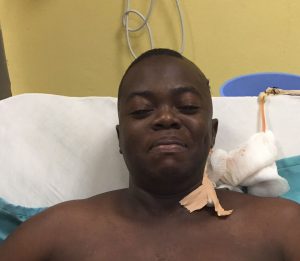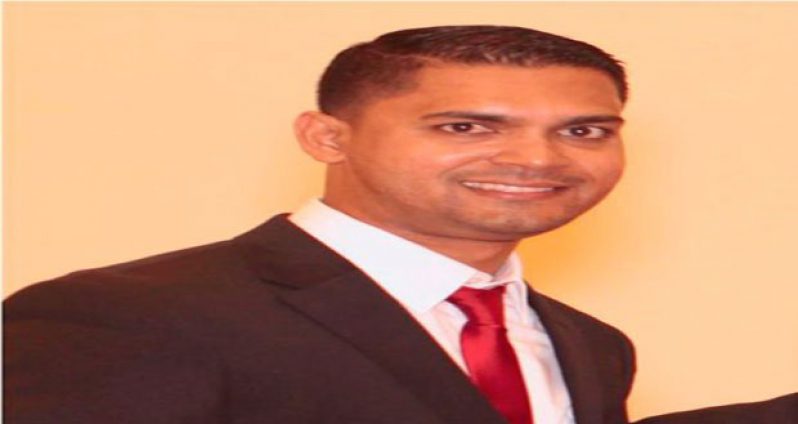MERE days ago, when 24-year-old Police Constable Victor Fausette was shot in the head, just above the left ear, by a mentally ill man in Linden, it was to Dr. Amarnauth Dukhi, Guyana’s first and only neurosurgeon, that the task was left to save the life of the gravely-wounded officer.Found lying in a pool of blood by residents of Linden, Fausette was first rushed to the Linden Hospital, before being transferred to the Georgetown Public Hospital Corporation (GPHC), where Dr. Dukhi had to perform on him an emergency brain surgery which has been deemed successful.

In an exclusive interview with this publication, Dr. Dukhi reminisced on that surgery, which happens to be his 61st successful operation since being placed at the GPHC in January 2015.
Gunshot injuries to the brain, he said, are very critical because they cause severe lesions to the brain and the skull. The survival rate internationally is very low, and success in these cases can be mere “oily” or “slippery” responses.
Fausette, he added, has had an “intracranial extension”, meaning the bullet penetrated soft tissues and went to the left side of his head, where there were injuries to the brain mass and other surrounding structures.
In such a case, Dr. Dukhi said, he had to remove the bullet by performing a craniotomy (surgical removal of a portion of the skull) to find the bullet, and then remove it whilst controlling the swelling and all intracranial bleeding.
DOING FAIRLY WELL
This was done, and the surgery was considered a success based on the patient’s response. “The officer is doing fairly well just days after his surgery, and is eating and talking as normal,” declared Dr. Dukhi.
Thus far, he said, Fausette is being monitored by a Glasgow Coma Scale (GSC) –- a neurological scale that aims to give a reliable, objective way of recording the conscious state of a person for initial as well as subsequent assessment — since gunshot injuries can cause a lot of surrounding brain tissue damage, which can led to deficits.
“We were able to control that, so we are still hoping for a full recovery with minimal neurological deficit obtained,” the Neurosurgeon disclosed.
Any gunshot injury to the brain in neurosurgery that comes out as a success like in the case of the police officer is always a plus, not just for neurosurgery, but also for the surgeon involved and his team that worked along with him to ensure a life was saved.
“It is a success not only for myself, but also for the Georgetown Public Hospital and the work we have been doing since I was placed there. It brings great satisfaction when you could save someone’s life, as in the case where the officer was shot point blank to his brain,” Dr. Dukhi explained.
Dr. Dukhi completed 15 successful surgeries in March; his remarkable expertise is manifested in the 61 successful surgeries he has completed to date.
THE INCIDENT
While at the Wisrock Police Outpost in Linden six days ago, 18-year-old mentally ill Regan Richards disarmed Police Constable Victor Fausette of his .38 police service revolver, and shot him in the head before walking out of the outpost with the gun in his hand. Fausette was the only rank on duty at the time of the incident, but given that the outpost is located in close proximity to the community, residents who heard the gunshot ran to the scene and saw Fausette lying in a pool of blood.
Richards, on the other hand, was walking the streets with a gun in his hand as residents feared for their lives. Members of the anti-crime patrol responded and found him hiding in his home. He was commanded to surrender the weapon, but responded by opening fire on the ranks, leaving them with no alternative other than to return fire, which eliminated him.
DR.DUKHI’S JOURNEY
Born in Skeldon, Corriverton, Dr. Dukhi’s journey as a neurosurgeon began when he graduated from the Skeldon Line Path Secondary School, having written the Caribbean Secondary Education Certificate (CSEC) exams in 1995 and emerged as the third best graduating student.
He then completed his Bachelor of Science degree in Biology and Bio Chemistry at the University of Guyana in 1999, and soon after received a scholarship through the Government of Guyana’s “Cuban Scholarship Programme”, through which he acquired a Bachelor of Medicine degree in 2006. Quite remarkably, he emerged as the best graduating student.
He returned to Guyana and served the Government for three consecutive years at the GPHC and the New Amsterdam Hospital. However, his specialty then was orthopedics.
Feeling the need to expand his knowledge in medicine and surgery, he then began his journey as an aspiring neurosurgeon, and this has led to him becoming Guyana’s first and only Neurosurgeon.
By Shivanie Sugrim


.jpg)











